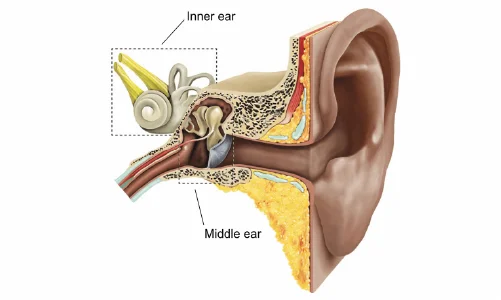Stapedectomy surgery is performed to improve hearing in individuals with otosclerosis, a condition where abnormal bone growth in the middle ear prevents the stapes bone from vibrating properly.
This surgery removes the stapes bone and replaces it with a prosthesis to restore the transmission of sound waves in our ears. Without timely treatment, otosclerosis can lead to progressive hearing loss and associated complications.
Hearing loss can greatly diminish your quality of life, disrupting communication and everyday activities. If your hearing loss is caused by otosclerosis, stapedectomy surgery might be a highly effective treatment. Consult the top ENT specialists for stapedectomy surgery at the CK Birla Hospital.

| Initial Stage: Mild Hearing Loss and Occasional Tinnitus |
Progressive Stage: Worsening Hearing Loss and More Frequent Tinnitus | Advanced Stage: Significant Hearing Impairment |
| Patients often experience mild hearing loss that may not be immediately noticeable.
It typically starts with difficulty hearing low-pitched sounds or whispering. Some patients may experience occasional tinnitus, which is a ringing or buzzing noise in the ears. |
Patients find it increasingly difficult to hear normal conversations, especially in noisy environments.
Tinnitus also becomes more frequent and persistent, which can be quite frustrating & distressing.
Abnormal bone growth in the middle ear is more significant, leading to further immobilization of the stapes bone and reduced sound transmission. |
Hearing loss is severe and significantly impairs the patient’s ability to communicate effectively.
Constant presence of tinnitus can further exacerbate the difficulty in hearing and understanding speech. Quality of life is markedly affected. Surgery, becomes crucial to restore hearing and improve overall well-being. |
| Aspect | Minimally Invasive Surgery | Traditional Open Surgery |
| Incisions | Smaller incisions | Larger incisions |
| Recovery Time | Shorter recovery period | Longer recovery period |
| Pain and Scarring | Less pain and minimal scarring | More pain and noticeable scarring |
| Hospital Stay | Shorter hospital stay | Longer hospital stay |
| Infection Risk | Reduced risk of infection | Higher risk of infection |
Stapedectomy surgery typically takes about 1-2 hours, depending on the complexity of the procedure and the individual patient’s condition.
Patients are mostly discharged on the same day of the surgery. The duration of the hospital stay may vary based on individual circumstances.
Patients can usually return to light activities within 1-2 weeks, but full recovery and return to normal activities may take up to 6-8 weeks. Avoid lifting heavy things.
While stapedectomy surgery is highly effective, otosclerosis can occasionally recur. Regular follow-up with your ENT specialist is recommended to monitor your condition.
Mild dizziness is common after stapedectomy surgery. However, if you experience severe or prolonged dizziness, contact your surgeon or healthcare provider immediately.
Most health insurance plans cover stapedectomy surgery, but coverage may vary. When planning the surgery, make sure to check with your insurance provider.
If you are considering stapedectomy surgery at the CK Birla Hospital is here to provide you with expert care and support. Contact us to schedule a consultation with our experienced ENT specialists.